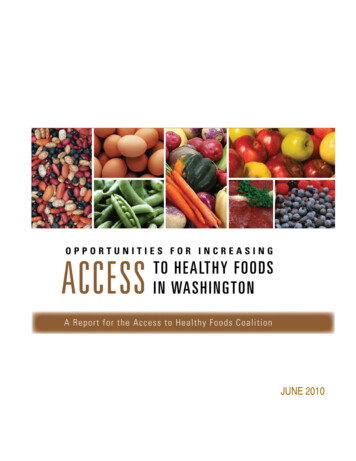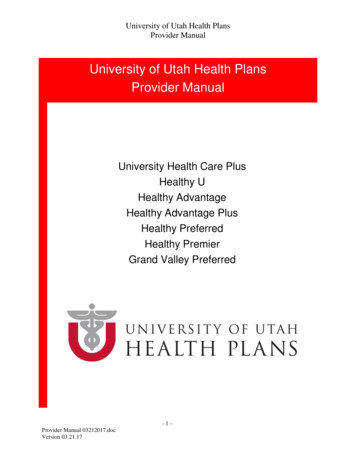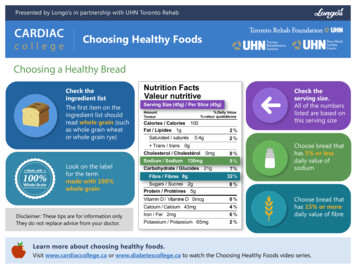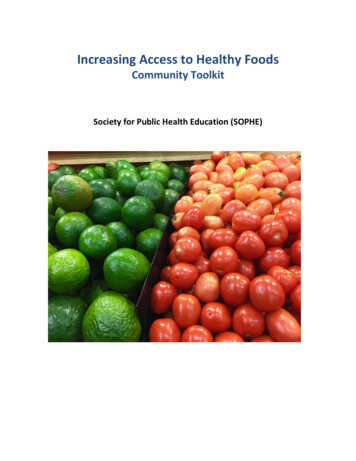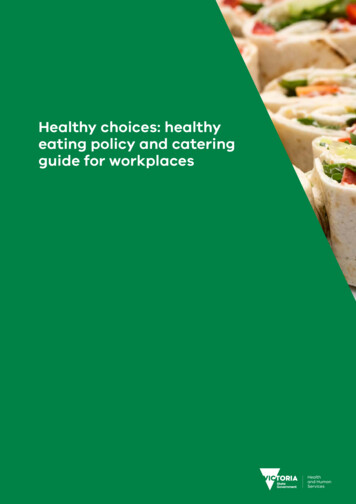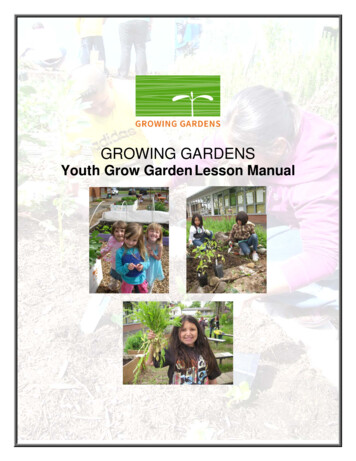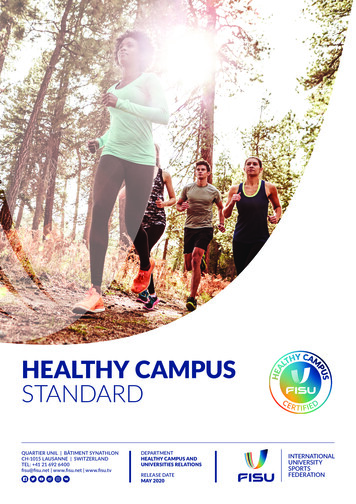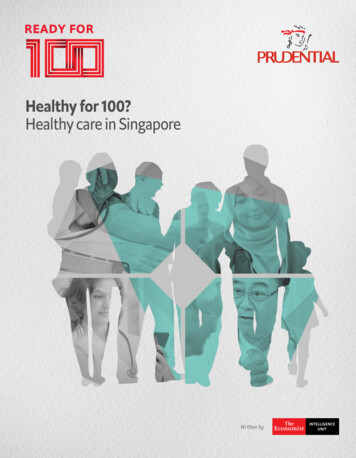
Transcription
Don’t put baby to bed with a bottle.Wipe baby’s gums gently with a soft, clean, wetcloth every day.For babies that are breastfeeding, it’s best to waituntil one month of age to use a pacifier.If baby uses a pacifier:o Don’t dip it in anything sweet, like sugar.o Only give a clean pacifier. If it falls out, washit. Don’t blow on, lick, or put in your mouth to“clean”.Germs that cause cavities can be spread from yourmouth to your baby’s. Don’t share anything thathas been in your mouth with your baby.Breastfeeding is best. Brush in the morning and brush and floss beforebedtime. Make a dental appointment for yourself. Ask about gum or mints with xylitol and mouthwashes to prevent cavities in your mouth.Resources for Parents For more health information about kids and teens,visit www.kidshealth.org.For help with food, housing, employment, healthcare, counseling, and more, call 2-1-1.If you feel overwhelmed, sad, or about to shake orharm your baby, call your doctor, 1-800-4-ACHILD (1-800-422-4453), or a friend for help.To quit smoking, call 1-800-NO-BUTTS(1-800-662-8887).Growing UpHealthyIf formula feeding, give formula with iron. Parents: Stop thespread of cavitygerms and take careof your own teeth.Moms: Eat healthy foods and drink lots of water.Nurse 8-12 times in 24 hours. The more younurse, the more milk you will make.Ask your doctor about vitamin D for baby.Pump and freeze milk for later use. Always hold baby close while feeding.Do not prop the bottle.Put only breast milk or formula in the bottle.Feed newborn baby about 2 ounces of formulaevery 2-3 hours – watch for baby cues*Feed a 1-2 month old baby about 2-3 ounces offormula every 3-4 hours.It’s OK if baby doesn’t finish every bottle.No honey or corn syrup. It can make baby verysick.Birth-2 Months Today’s Date:Seek help early for any feedingproblems. Feed baby more as baby grows.* Learn baby cues when hungry or full.- Hungry: Rooting, sucking, handmovements, or fussing. Crying is a latecue.- Full: Turns head away, closes mouth,relaxes hand or falls asleep.Name:Length:Weight:Next Appointment:Date:Time:Important phone numbers:Police, fire, ambulance: Call 911CA Poison Action Line: Call 1-800-222-1222WIC: 1-888-942-9675Food Stamps – Supplement Nutritional Assistance Program:1-877-847-3663Developed by the Nutrition, Oral Health, and HealthEducation Subcommittees of the California ChildHealth and Disability Prevention (CHDP) ProgramExecutive Committee. Rev 06/2014.
Keeping Baby Healthy Take baby for regular health check-ups andimmunizations (shots).Keep baby’s hair, hands, body, clothes, car seat,and bedding clean and dry.Wash your hands with soap and water afterchanging diapers.Keep baby away from:o Loud noises and music to protect hearing.o Tobacco smoke and nicotine products.o Crowds and sick people.Talk to doctor before giving baby any medicinesor home remedies.Preventing Injury Never leave baby alone:o On a bed or changing table.o With a stranger or a pet.Never shake, toss, or swing baby in the air. Nevertie pacifier around neck.Keep medicines, cleaning supplies, and plants outof child’s reach. Use childproof safety latches andlocks on cabinets.Baby can choke on small objects. Keep keys,unsafe toys, jewelry, plastic bags, and balloonsaway from baby. Remove string from sweatshirthood.Taking care of a new baby can give you joy,worry, and stress.Sleep Safety Baby may not always grow or act like other babies.Hold, cuddle, and play with baby. Get to know whatmakes your baby special. Crying Crying is one way baby talks to you. It could meanbaby: Is hungry. Has a wet diaper. Is tired or sick. Needs to be held. Is scared.If baby keeps crying: Wrap baby in blanket.Rock baby.Sing or play soothingmusic.Stroke baby’s back gently.Take baby for a ride instroller or car.Call the doctor.Tips and Activities Give baby colorful soft toys.Take baby outdoors.Protect baby with hat or shade covering toprevent sunburns or overheating. Don’t putsunscreen until baby is 6 months old.Under adult supervision, put baby on stomachto build head control.Always place baby on back to sleep on a firmmattress with fitted sheet. No pillows, softbedding, or toys in crib. Don’t overdress baby.Use a crib free of lead-based paint with bars nomore than 2 3/8 inches apart.Keep crib away from peeling paint, windows,drapes, cords, and blinds.Bath Safety Set water heater to less than 120 F and checkwater before putting baby in bath.Never leave baby alone in bath.Car Safety Never leave baby alone in car.Properly buckle baby in a rear-facing car seat inthe back seat (never in front of an airbag).Environmental Safety Use clean, safe drinking water for baby formula.Use cold tap water and run for 1-3 minutes beforeusing.Test drinking water for lead, nitrates, andcoliforms, if from a private well.If breastfeeding, avoid eating king mackerel, shark,swordfish, and tilefish because they contain highlevels of mercury. Eat up to 2 meals a week of fishand shellfish that are low in mercury, but limitalbacore “white” tuna to 1 meal per week. Checklocal fish advisories about the safety of fish caughtby family and friends.Prepare for Emergencies Be prepared. Plan for emergencies.Learn infant CPR.Put smoke and carbon monoxide alarms in hallwayand bedrooms. Check alarms every 6 months.
Rock baby to sleep or give a clean pacifier at napor at bedtime. Don’t put baby to bed with a bottle.Wipe baby’s gums gently with a soft, clean, wetcloth every day.If baby uses a pacifier:o Don’t dip it in anything sweet, like sugar.o Only give a clean pacifier. If it falls out, washit. Don’t blow on, lick, or put in your mouth to“clean”.Germs that cause cavities can be spread from yourmouth to your baby’s. Don’t share anything thathas been in your mouth with your baby.Don’t put pacifier inown mouth to“clean”.Parents: stop the spread of cavity germs and take careof your own teeth. Brush in the morning and brush and floss beforebedtime. Make a dental appointment for yourself. Ask about gum or mints with xylitol and mouthwashes to prevent cavities in your mouth.Resources for Parents For more health information about kids and teens,visit www.kidshealth.org.For help with food, housing, employment, healthcare, counseling, and more, call 2-1-1.If you feel overwhelmed, sad, or about to shake orharm your baby, call your doctor, 1-800-4-ACHILD (1-800-422-4453), or a friend for help.To quit smoking, call 1-800-NO-BUTTS(1-800-662-8887).Breastfeeding is best. Moms: Eat healthy foods and drink lots ofwater.Nurse 8-12 times in 24 hours. The more younurse, the more milk you will make.Ask your doctor about vitamin D for baby.Pump and freeze milk for later use.Growing UpHealthy3-4 Months If formula feeding, give formula with iron. Always hold baby close while feeding.Do not prop the bottle.Feed baby 3-4 ounces of formula every 3-5hours – watch for baby cues*.It’s OK if baby doesn’t finish every bottle.No honey or corn syrup. It can make baby verysick.Seek help early for any feedingproblems. Feed baby more as baby grows.Breast milk and formula are the only foodbaby needs. Wait until baby is 6 months oldto feed solid foods.* Learn baby cues when hungry or full.- Hungry: Rooting,sucking, handmovements, orfussing. Crying is alate cue.- Full: Turns headaway, closes mouth,relaxes hand or fallsasleep.WIC: 1-888-942-9675Food Stamps – Supplement Nutritional Assistance Program:1-877-847-3663Today’s Date:Name:Length:Weight:Next Appointment:Date:Time:Important phone numbers:Police, fire, ambulance: Call 911CA Poison Action Line: Call 1-800-222-1222Developed by the Nutrition, Oral Health, and HealthEducation Subcommittees of the California ChildHealth and Disability Prevention (CHDP) ProgramExecutive Committee. Rev 06/2014.
Keeping Baby Healthy Always put baby on clean surface.Take baby for regular health check-ups andimmunizations (shots).Keep baby’s hair, hands, body, clothes, car seat,and bedding clean and dry.Wash your hands with soap and water afterchanging diapers.Keep baby away from:o Loud noises and music to protect hearing.o Tobacco smoke and nicotine products.o Crowds and sick people.Talk to doctor before giving baby any medicinesor home remedies.Preventing Injury Check labels to make sure toys are lead-free.Never leave baby alone:o On a bed or changing table.o With a stranger or a pet.Never shake, toss, or swingbaby in the air. Never tiepacifier around neck.Keep medicines, cleaningsupplies, and plants out ofchild’s reach. Usechildproof safety latchesand locks on cabinets.Baby can choke on smallobjects. Keep keys, unsafetoys, jewelry, plastic bags,and balloons away from baby. Remove string fromsweatshirt hood.All babies are different.Babies develop at their own rates. Baby may notalways grow or act exactly like other babies andmay need time to warm up to people and activities.Get to know what makes your baby special. Callyour doctor if there are any concerns.Baby may: Lift head when on stomach.Smile, laugh, coo, and babble.Sit with support.Play with hands.Turn body from side to side.Splash in the tub.Bring objects to mouth.Kick feet while lying on back.Sleep Safety Bath Safety Play games, like peek-a-boo with baby.Cuddle, talk, sing, read, play soft music, andplay gently with baby.Give baby colorful soft toys.Take baby outdoors.Protect baby with hat or shade covering. Don’tput sunscreen until baby is 6 months old.Under adult supervision, put baby on stomachto build head control.Set water heater to less than 120 F and checkwater before putting baby in bath.Never leave baby alone in bath.Car Safety Tips and Activities Always place baby on back to sleep on a firmmattress with fitted sheet. No pillows, softbedding, or toys in crib. Don’t overdress baby.Use a crib free of lead-based paint with bars nomore than 2 3/8 inches apart.Keep crib away from peeling paint, windows,drapes, cords, and blinds.Never leave baby alone in car.Properly buckle baby in a rear-facing car seat inthe back seat (never in front of an airbag).Environmental Safety Use clean, safe drinking water for baby formula.Use cold tap water and run for 1-3 minutes beforeusing.Test drinking water for lead, nitrates, andcoliforms, if from a private well.If breastfeeding, avoid eating king mackerel, shark,swordfish, and tilefish because they contain highlevels of mercury. Eat up to 2 meals a week of fishand shellfish that are low in mercury, but limitalbacore “white” tuna to 1 meal per week. Checklocal fish advisories about the safety of fish caughtby family and friends.Prepare for Emergencies Be prepared. Plan for emergencies.Learn infant CPR.Put smoke and carbon monoxide alarms in hallwayand bedrooms. Check alarms every 6 months.
For teething pain, rub gums gently or give a cold,clean, teething ring.Ask doctor or dentist about fluoride varnish ordrops for baby.Sharing toothbrushes, spoons, or cups can spreadcavity germs.Medicines may have sugar or cause dry mouth.Follow with water or brush teeth.Don’t put baby to bed with a bottle.Wipe baby’s gums and teeth gently with a soft,clean, wet cloth or a toothbrush with a rice-grainsize of fluoride toothpaste twice a day. Wipe offany excess toothpaste.If baby uses a pacifier:o Don’t dip it in anything sweet, like sugar.o Only give a clean pacifier. If it falls out, washit. Don’t blow on, lick, or put in your mouth to“clean”.Hold baby while feeding. Proppingbottle or leaving breast milk in themouth can cause cavities.Parents: Stop the spread of cavity germs and take careof your own teeth. Brush in the morning and brush and floss beforebedtime. Make a dental appointment for yourself. Ask about gum or mints with xylitol and mouthwashes to prevent cavities in your mouth.Keep feeding baby breast milk or formula withiron to age 1. For more health information about kids and teens,visit www.kidshealth.org.For help with food, housing, employment, healthcare, counseling, and more, call 2-1-1.If you feel overwhelmed, sad, or about to shake orharm your baby, call your doctor, 1-800-4-ACHILD (1-800-422-4453), or a friend for help.To quit smoking, call 1-800-NO-BUTTS(1-800-662-8887).Growing UpHealthyOnly breast milk, formula, orwater in bottle. No juice orsoda.Starting solid foodsBaby is ready when he/she: Sits up and holds head.Opens mouth for food.Closes lips over spoon.Shows interest in your food.Feeding tips Resources for Parents Baby nurses longer as baby grows. Offer moreformula, 4-6 ounces every 3-5 hours, as babygrows.5-6 MonthsHealthy baby teeth are important. Give one new food at a time every 7 days.Give iron-rich foods, like baby cereal andpureed meats.Feed 2-3 times a day in 10-15 minute meals.Baby is full when baby spits food, looks away,or eats slower.Look for any bad reactions (skin rash,diarrhea, or breathing problems) with newfoods.Do not give cow’s milk, nuts, eggs, fish, andwheat until baby is one year old due topossible reactions.No honey or corn syrup. It can make baby verysick.WIC: 1-888-942-9675Food Stamps – Supplement Nutritional Assistance Program:1-877-847-3663Today’s Date:Name:Length:Weight:Next Appointment:Date:Time:Important phone numbers:Police, fire, ambulance: Call 911CA Poison Action Line: Call 1-800-222-1222Developed by the Nutrition, Oral Health, and HealthEducation Subcommittees of the California ChildHealth and Disability Prevention (CHDP) ProgramExecutive Committee. Rev 06/2014.
Keeping Baby Healthy Always put baby on a clean surface.Take baby for regular health check-ups andimmunizations (shots).Keep baby’s hair, hands, body, clothes, car seat,and bedding clean and dry.Wash your hands with soap and water afterchanging diapers.Keep baby away from:o Loud noises and music to protect hearing.o Tobacco smoke and nicotine products.o Crowds and sick people.Talk to doctor before giving baby any medicines orhome remedies.Do not fill bottles or mix formula with water froma ceramic or hand-made water crock.Preventing Injury Do not use infant walkers or hanging jumpers asthey can cause injuries.Check labels to make sure toys are lead-free.Never leave baby alone:o On a bed or changing table.o With a stranger or a pet.Never shake, toss, or swing baby in the air. Nevertie pacifier around neck.Keep medicines, cleaning supplies, and plants outof child’s reach. Use childproof safety latches andlocks on cabinets.Baby can choke on small objects. Keep keys,unsafe toys, jewelry, plastic bags, and balloonsaway from baby. Remove string from sweatshirthood.All babies are different.Baby may not always grow or act exactly like otherbabies and may need time to warm up to people andactivities. Call your doctor if there are any concerns.Baby may: Reach for objects.Sit up with support.Bring objects to mouth.Roll over.Feel and shake objects.Squeal, laugh, and smile.Tips and Activities Babies learn more quickly when you spend timewith them. Play, talk, sing, and read to baby.Give baby colorful soft toys that make softnoises when moved or squeezed.Check toys for loose parts that baby mayswallow or choke on. Keep small toys out ofbaby’s reach.Put baby on a clean blanket on floor to play. Letbaby crawl and to build strong legs and arms.Protect baby with hat or shade covering. Don’tput sunscreen until baby is 6 months old.Give baby attention and love.Sleep Safety Always place baby on back to sleep on a firmmattress with fitted sheet. No pillows, softbedding, or toys in crib. Don’t overdress baby.Use a crib free of lead-based paint with bars nomore than 2 3/8 inches apart.Keep crib away from peeling paint, windows,drapes, cords, and blinds.Bath Safety Set water heater to less than 120 F and checkwater before putting baby in bath.Never leave baby alone in bath.Car Safety Never leave baby alone in car.Properly buckle baby in a rear-facing car seat inthe back seat (never in front of an airbag).Protect Baby Breathing carbon monoxide can cause suddensickness and death.o Never warm up a car in the garage, even withthe door open.o Never use a generator indoors, in any closedoff space, or near windows or doors.Dust may contain lead and other harmfulchemicals and allergens. Clean floors and surfacesoften and wash your and your baby’s hand often.Prepare for Emergencies Be prepared. Plan for emergencies.Learn infant CPR.Put smoke and carbon monoxide alarms in hallwayand bedrooms. Check alarms every 6 months.
Lift baby’s lips and look at all sides of teeth. Calldentist if there are any white, brown, or blackspots.Ask doctor or dentist about fluoride varnish ordrops for baby.Medicines may have sugar or cause dry mouth.Follow with water or brush teeth.Don’t put baby to bed with bottle.Clean all sides of baby’s teeth twice a day. Use achild’s toothbrush and a rice-grain size of fluoridetoothpaste. Wipe off any excess toothpaste.Don’t dip pacifier in anything sweet like sugar.Keep feeding baby breast milk or formula withiron to age 1. SpoonsCupsParents: Stop the spread of cavity germs and take careof your own teeth. Brush in the morning and brush and floss beforebedtime. Make a dental appointment for yourself. Ask about gum or mints with xylitol and mouthwashes to prevent cavities in your mouth.Resources for Parents For more health information about kids and teens,visit www.kidshealth.org.For help with food, housing, employment, healthcare, counseling, and more, call 2-1-1.If you feel overwhelmed, sad, or about to shake orharm your baby, call your doctor, 1-800-4-ACHILD (1-800-422-4453), or a friend for help.To quit smoking, call 1-800-NO-BUTTS(1-800-662-8887).Growing UpHealthyGive baby healthy foods in 3 small mealsand 2-3 small snacks a day.Sharing can spread cavity germs.ToothbrushesIf formula feeding, baby will now take 6-8ounces 3-4 times daily.Baby may nurse less as solids increase.Teach baby to use a cup for breast milk,formula, or water.Do not give baby soda, juice, or other sugarydrinks.7-9 MonthsHealthy baby teeth are important. Give iron-rich baby cereals andpureed meats, fruits,vegetables, or cookedbeans by spoon.Give finger foods: smallpieces of peeled, soft fruit,toast or unsalted crackers.Do not add salt or sugar tofoods.Stop giving food when baby turns head awayand closes mouth.Sit baby with family at meal or snack times for10-15 minutes.Some foods cause choking. Do notfeed baby: Round (hot dogs, grapes,popcorn, nuts), Pitted (cherries), Hard (candy, raw vegetables), or Sticky (nut butters) foods.WIC: 1-888-942-9675Food Stamps – Supplement Nutritional Assistance Program:1-877-847-3663Today’s Date:Name:Length:Weight:Next Appointment:Date:Time:Important phone numbers:Police, fire, ambulance: Call 911CA Poison Action Line: Call 1-800-222-1222Developed by the Nutrition, Oral Health, and HealthEducation Subcommittees of the California ChildHealth and Disability Prevention (CHDP) ProgramExecutive Committee. Rev 06/2014.
Baby learns quickly when you teach by gentlyshowing and not by punishing.Keeping Baby Healthy Take baby for regular health check-ups andimmunizations (shots).Keep baby’s hair, hands, body, clothes, car seat,and bedding clean and dry.Wash your hands with soap and water afterchanging diapers and before baby eats.Keep baby away from:o Loud noises and music to protect hearing.o Tobacco smoke and nicotine products.o Crowds and sick people.Talk to doctor before giving baby any medicines orhome remedies.Do not fill bottles or mix formula with water froma ceramic or hand-made water crock.Preventing Injury Check labels to make sure toys are lead-free.Do not use infant walkers or hanging jumpers asthey can cause injuries.Never leave baby alone:o On a bed or changing table.o With a stranger or a pet.Never shake, toss, or swing baby in the air. Nevertie pacifier around neck.Keep medicines, cleaning supplies, and plants outof child’s reach. Use childproof safety latches andlocks on cabinets.Baby can choke on small objects. Keep keys,unsafe toys, jewelry, plastic bags, and balloonsaway from baby. Remove string from sweatshirthood.Sleep Safety Baby may be afraid of new people and cry whenyou leave. Comfort baby and make baby feel safe.Say goodbye when you leave. Baby may: Eat small pieces of soft food.Crawl.Sit alone without support.Bring objects to mouth.Turn when name is called.Move objects from hand to hand.Tips and Activities Give toys that move, such as large balls orrolling toys.Give baby empty boxes, pots, and pans to playwith.Take baby for walks outside and usesunscreen.Help baby learn to talk by naming things babysees.Let baby crawl on a clean blanket to buildstrong legs and arms.Play games, like peek-a-boo with baby.Put baby to sleep at the same time each night.A story or song can make bedtime relaxing.Always place baby on back to sleep on a firmmattress with fitted sheet. No pillows, softbedding, or toys in crib. Don’t overdress baby.Use a crib free of lead-based paint with bars nomore than 2 3/8 inches apart.Keep crib away from peeling paint, windows,window sills, drapes, cords, and blinds.Bath Safety Set water heater to less than 120 F and checkwater before putting baby in bath.Never leave baby alone in bath.Car Safety Never leave baby alone in car.Properly buckle baby in a rear-facing car seat inthe back seat (never in front of an airbag).Environmental SafetyProtect baby from contact with household and paintproducts. Store insect killers, cleaning products, orhousehold chemicals in their original packages andkeep out of child’s reach. Do not use insect killers or other householdproducts near children or pets. If needed, use insectbaits/traps/gels instead of sprays/dust. Choose safe cleaning products. Stay away fromproducts with ammonia, chlorine, or a skull andcross bone. Don’t let baby eat or play where there’s paint dust,peelings, or chips.Prepare for Emergencies Be prepared. Plan for emergencies.Learn infant CPR.Put smoke and carbon monoxide alarms in hallwayand bedrooms.Check alarms every 6 months.
Take baby to dentistby age one!Healthy baby teeth are important. Lift baby’s lips and look at all sides of teeth. Calldentist if there are any white, brown, or blackspots.Ask doctor or dentist about fluoride varnish ordrops for baby. Keep out of child’s reach.Medicines may have sugar or cause dry mouth.Follow with water or brush teeth.Don’t put baby to bed with bottle.Clean all sides of baby’s teeth twice a day. Use achild’s toothbrush and a rice-grain size of fluoridetoothpaste. Wipe off any excess toothpaste.Don’t dip pacifier in anything sweet like sugar.Parents: Stop the spread of cavity germs and take careof your own teeth. Brush in the morning and brush and floss beforebedtime. Make a dental appointment for yourself. Ask about gum or mints with xylitol and mouthwashes to prevent cavities in your mouth.Resources for Parents For more health information about kids and teens,visit www.kidshealth.org.For help with food, housing, employment, healthcare, counseling, and more, call 2-1-1.If you feel overwhelmed, sad, or about to shake orharm your baby, call your doctor, 1-800-4-ACHILD (1-800-422-4453), or a friend for help.To quit smoking, call 1-800-NO-BUTTS(1-800-662-8887). If formula feeding, baby will now take 4-6ounces 3-4 times daily.Baby may nurse less as solid foods increase.By age one; baby only drinks from small cup.It’s OK to give baby cow’smilk at age 1.Give baby breast milk,formula, or water in a cupwith meals.Do not give baby soda,juice, or other sugarydrinks.Growing UpHealthy10-12 MonthsKeep feeding baby breast milk or formula withiron to age 1.Give baby healthy foods in 3 small mealsand 2-3 small snacks a day. Give pureed, mashed, and soft lumpy foods tohelp baby learn to chew.At each meal, give iron-rich foods, such ascooked and finely chopped meats or chickenor mashed tofu or beans.Give finger foods: small pieces of soft, peeledfruit, toast or unsalted crackers.Some foods cause choking. Do notfeed baby: Round (hot dogs, grapes,popcorn, nuts), Pitted (cherries), Hard (candy, raw vegetables), or Sticky (nut butters) foods.WIC: 1-888-942-9675Food Stamps – Supplement Nutritional Assistance Program:1-877-847-3663Today’s Date:Name:Length:Weight:Next Appointment:Date:Time:Important phone numbers:Police, fire, ambulance: Call 911CA Poison Action Line: Call 1-800-222-1222Developed by the Nutrition, Oral Health, and HealthEducation Subcommittees of the California ChildHealth and Disability Prevention (CHDP) ProgramExecutive Committee. Rev 06/2014.
Keeping Baby Healthy Don’t let baby eat paints chips or dirt, or play inbare dirt.Take baby for regularhealth check-ups andimmunizations(shots).Keep baby’s hair,hands, body, clothes,car seat, and beddingclean and dry. Washtoys often.Wash your hands with soap and water afterchanging diapers and before baby eats.Keep baby away from:o Loud noises and music to protect hearing.o Tobacco smoke and nicotine products.o Crowds and sick people.Talk to doctor before giving baby any medicines orhome remedies.Do not fill bottles or mix formula with water froma ceramic or hand-made water crock.Preventing Injury Check labels to make sure toys are lead-free.If biking, make sure baby is properly buckled inand wearing a helmet.Do not use infant walkers or hanging jumpers asthey can cause injuries.Never leave baby alone:o On a bed or changing table.o With a stranger or a pet.Never shake, toss, or swing baby in the air. Nevertie pacifier around neck.Keep medicines, cleaning supplies, and plants outof child’s reach. Use childproof safety latches andlocks on cabinets.Baby can choke on small objects. Keep keys,unsafe toys, jewelry, plastic bags, and balloonsaway from baby. Remove string from sweatshirthood.Baby learns quickly when you teach by gentlyshowing and not by punishing.Baby may be afraid of new people and cry whenyou leave. Comfort baby and make baby feel safe.Say goodbye when you leave.Baby may: Get into a sitting position.Poke with fingers.Bang together two objects.Stand when holding onto couch.Copy speech and sounds.Say “ma-ma” and “da-da”.Tips and Activities Give toys that move, such as large balls orrolling toys.Give baby empty boxes, pots, and pans to playwith.Take baby for walks outside and usesunscreen.Help baby learn to talk by naming things babysees.Let baby crawl on clean blanket to build stronglegs and arms.Play games, like peek-a-boo with baby.Put baby to sleep at the same time each night.A story or song can make bedtime relaxing.Sleep Safety Set mattress at lowest level.Always place baby on back to sleep on a firmmattress with fitted sheet. No pillows, softbedding, or toys in crib. Don’t overdress baby.Use a crib free of lead-based paint with bars nomore than 2 3/8 inches apart.Keep crib away from peeling paint, windows,drapes, cords, and blinds.Bath Safety Set water heater to less than 120 F and checkwater before putting baby in bath.Never leave baby alone in bath, pool, or near wateror toilet.Put a fence with a self-latching gate around a poolor spa.Car Safety Never leave baby alone in car.Properly buckle baby in a rear-facing car seat inthe back seat until age one and at least 20 pounds.Never put baby in front of an airbag.Environmental Safety Have baby tested for lead poisoning at 12 monthsand 24 months.Do not let young children eat fish that contain highlevels of mercury, like king mackerel, shark,swordfish, and tilefish.Babies and children are more easily hurt bychemicals than adults. Remove any chemicals fromfruits/vegetables by peeling or washing them incold water.Prepare for Emergencies Be prepared. Plan for emergencies.Learn infant CPR.Put smoke and carbon monoxide alarms in hallwayand bedrooms.Check alarms every 6 months.
A child needs a “dental home”. Visit the dentisttwice a year, or as advised by dentist.Sharing toothbrushes, straws, spoons, or cups canspread cavity germs. Do not chew food for child.Lift child’s lips and look at all sides of teeth. Calldentist if there are any white, brown, or blackspots.Ask doctor or dentist about fluoride varnish ordrops for child. Keep out of child’s reach.Clean all sides of child’s teeth twice a day. Use achild’s toothbrush and rice-grain size of fluoridetoothpaste. Wipe off any excess toothpaste.Medicines may have sugar or cause dry mouth.Follow with water or brush teeth.Keep child’s teeth healthy tochew, speak, and save roomfor adult teeth.Parents: Stop the spread of cavity germs and take careof your own teeth. Brush in the morning and brush and floss beforebedtime. Make a dental appointment for yourself. Ask about gum or mints with xylitol and mouthwashes to prevent cavities in your mouth.Resources for Parents For more health information about kids and teens,visit www.kidshealth.org.For help with food, housing, employment, healthcare, counseling, and more, call 2-1-1.If you feel overwhelmed, sad, or about to shake orharm your baby, call your doctor, 1-800-4-ACHILD (1-800-422-4453), or a friend for help.To quit smoking, call 1-800-NO-BUTTS(1-800-662-8887).Feed healthy food at regulartimes with 3 meals and 2-3small snacks. Child feeds self with spoonor baby fork.Serve small portions.Give family foods and softfinger foods, such as meats,fish, eggs, cheese, or tofu.Give soft fruit or cooked vegetables at mealsand snacks.Offer child new foods often to try new tastes.Have child eat only during meals and snacks.Growing UpHealthy13-15 MonthsBaby teeth must last 6-10 years.Make family meals a happy time. Teach child to wash hands before meals.Eat together and show table manners.Your child learns from watching you.Child uses a small cup for all drinks. Give ½-¾ cup cow’s milk or fortified milkalternative in a cup 3-4 times a day.Limit 100% fruit juice to ½-¾ cup a day.Do not give soda or other sugary drinks.Some foods cause choking. Do notfeed baby: Round (hot dogs, grapes,popcorn, nuts), Pitted (cherries), Hard (candy, raw vegetables), or Sticky (nut butters) f
Wipe baby’s gums gently with a soft, clean, wet cloth every day. nurse, the more milk you will make.If baby uses a pacifier: o Don’t dip it in anything sweet, like sugar. o Only give a clean pacifier. If it falls out, wash it. Don’t blow on
